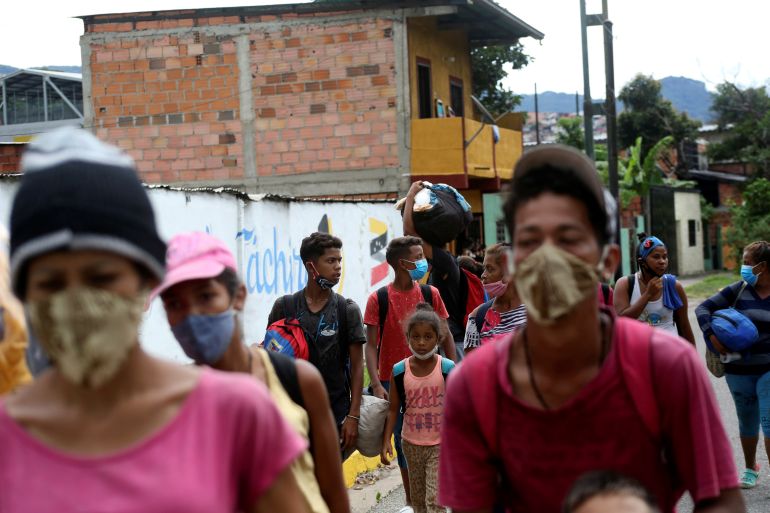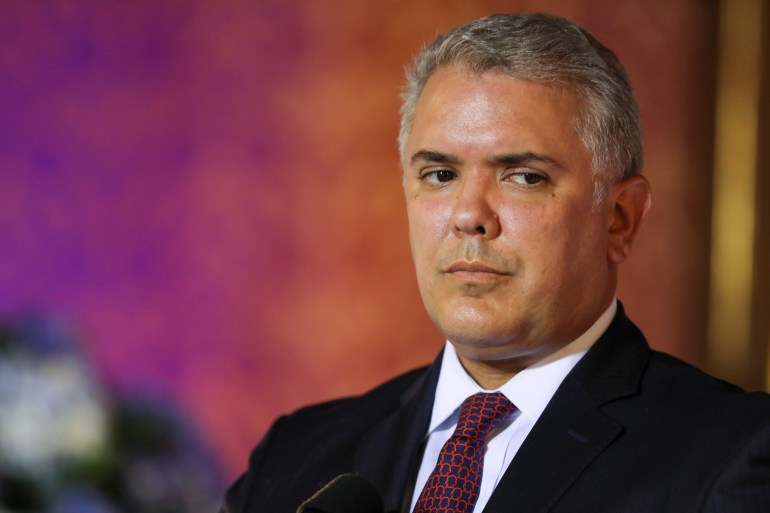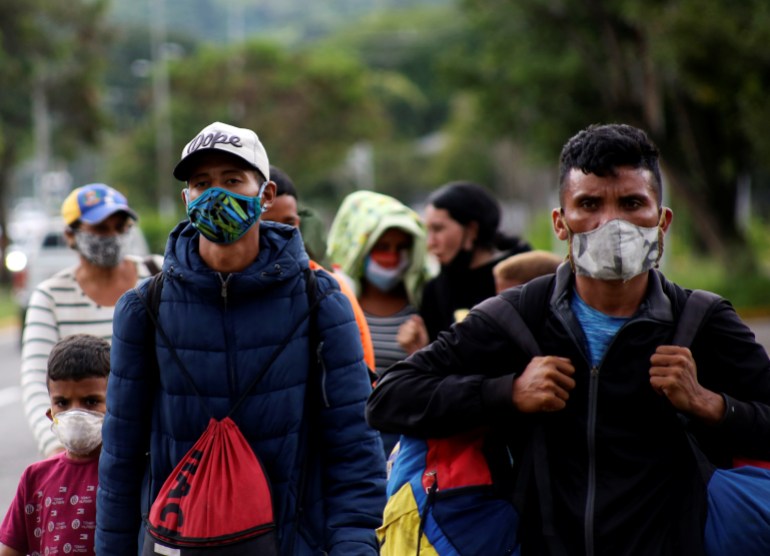Colombia to grant temporary protection to nearly 1m Venezuelans
Move means Venezuelan migrants and asylum seekers will have greater access to formal jobs and social services.

Bogota, Colombia – Venezuelan migrants and asylum seekers in Colombia will be granted protected status for up to 10 years, Colombian President Ivan Duque announced on Monday alongside Filippo Grandi, the United Nations High Commissioner for Refugees.
Venezuelans who arrived in Colombia before January 31 will be allowed to remain in the country for a decade under the new rules. Holding protected resident status will also allow migrants to legally work and help them integrate into society.
Keep reading
list of 3 items‘The fight continues’: Colombia protests persist despite pandemic
Venezuela: A Sinking Revolution
During the meeting, Duque said Venezuelans have left their country “due to the dictatorship and poverty” and that “it hurts us to see these circumstances”.
The United Nations estimates approximately 5.4 million Venezuelans have fled their country amid a crippling economic crisis, as well as threats of violence, political instability and a lack of basic goods and services.
More than 1.7 million Venezuelans now live in neighbouring Colombia, and of that, some 966,000 do not have legal status in the country, according to Colombia’s migration authority.
Most arrive penniless, and informally – through makeshift border crossings and without the necessary paperwork or migration stamp to gain access to formal employment or healthcare.
Migration authorities are now placing greater emphasis on encouraging migrants and asylum seekers to enter Colombia through formal checkpoints.
Humanitarian organisations and policymakers in Colombia and abroad welcomed Monday’s announcement.
“Everyday the needs of Venezuelans in Colombia are growing, exacerbated by the effects of the [coronavirus] pandemic,” said Marianne Menjivar, the International Rescue Committee’s Colombia and Venezuela director.
“Colombia has become the country in South America hosting the largest number of Venezuelan migrants … Regularization initiatives like the one announced today are a step towards ensuring the protection of people who live in vulnerable conditions, empowering them with tools to rebuild their lives,” she said in a statement.
Hugh Aprile, Colombia director for Mercy Corps, also hailed the decision as “historic”.
“This is an important first step toward helping to ensure the integration of this population that has been marginalised as a result of their illegal status,” said Aprile, who added however that Venezuelan migrants still face significant challenges accessing education, health and other services.
“Resolving these problems will require the support of government, private sector, and NGOs throughout the country,” Aprile said.

Some observers have raised concerns, however, about the government’s ability to logistically grant protected status to so many Venezuelan migrants and asylum seekers and to financially provide them with access to social services.
Colombia does not receive anywhere near as much international aid funding compared with other global migration crises, such as Syria and Sudan, said Sergio Guzman, director of Colombia Risk Analysis, a risk consultancy firm in Bogota.
Brookings Institution analysts estimated in December 2019 that the international community had spent $580m to respond to the Venezuelan displacement crisis in its first four years, compared to $7.8bn spent in the first four years of the Syrian refugee crisis response.
“Colombia is underfunded, facing a pronounced fiscal deficit, having to sell government assets to finance its current spending levels, which are bound to grow with additional demand from Venezuelan citizens,” Guzman told Al Jazeera.
He highlighted Colombia’s continued efforts to accommodate those fleeing the neighbouring Andean nation.
“Colombia’s treatment of Venezuelan migrants has for a long time offered a sharp contrast with how other countries, particularly in Europe and North America, address the circumstances faced by people fleeing political and economic turmoil,” he said.

Ronal Rodriguez, who runs the observatory on Venezuelan migration at Bogota’s Rosario University, also said many sociopolitical issues stand in the way of the government actually fulfilling its promises to better integrate Venezuelans.
“Colombia is a country that’s great at making very good laws, but has huge problems in putting them into practice and I don’t think this case is going to be an exception,” he told Al Jazeera.
“Colombia is currently going through one of its toughest moments, with lots of social and political issues, and due to everything that’s been going on with the pandemic, social tension is escalated.
“And to include Venezuelan migration is going to come with a lot of costs, and we’ll have to see how they implement it in the short term … It’s a major challenge.”